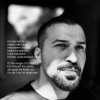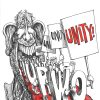
By Alan McGuire
In the Madrid underground, there’s an anti-drugs advert that shows a mirror alongside the words: “You are seeing who is responsible for your life.” It’s a campaign that aims to empower through self-awareness but it ends up reflecting an isolating individualism: the logic of neoliberalism.
This mirror doesn’t reflect the stories of poverty, trauma, or housing insecurity. It doesn’t talk about the structures that push people into drug addiction – precarious labour, austerity, neglect, state violence, structural racism, ingrained sexism and both physical and mental ableism. It reflects you. Just you. It individualizes pain, and prejudice and amplifies all we are working against. The dog-eat– dog mentally of late capitalism.
This is not a mistake. This is not an oversight. It is society under neoliberalism. Something well-meaning advertising, self-help books, Tik Tok videos, Instagram posts, soap opera storylines, pop songs and friends push every day. We parrot this logic as advice and common sense. An ideology that tells us that every failure is personal, every hardship is the result of a bad choice, and every solution a matter for the individual. It removes identification with the social, the communal, the structural. You are on your own.
It replaces solidarity with self-help and community with competition.
Addiction is not simply a choice, but often a response to alienation to a system we can’t all possibly live up to or fit in. Hustle culture and passive incomes are its latest tricks. A world where Only Fans are the answer.
This form of ideology, often referred to as neoliberalism, is where responsibility is entirely individual. Adverts and culture are not neutral. In Madrid, this kind of cultural product reflects the dominant politics of the regional conservative government, which cuts social support while preaching personal responsibility. It is the smiling face of austerity that gives you permission to look away when you see fellow human beings suffering, lying in the gutter. They tell you to pull yourself up by the bootstraps – but what if you can’t afford boots or laces?
What does real change look like?
As Mao Zedong argued in Combat Liberalism, radical politics must reject the cult of the self. This doesn’t mean denying ourselves, but making change happen through collective struggle. Hyper-individualism fragments people. It turns citizens into consumers and compañeros into competitors.
We must build a culture that is collective. A culture that treats addiction not as a choice, but a public health emergency. One with its foundations in care.
That means rejecting or reinterpreting the narratives we’re sold. From metros to media, and from marketing to music. It means telling stories of community, solidarity, and structural abuses. It means refusing to see only yourself, but as one of many. If the mirror says you are responsible: smash it. We are accountable to and for each other. For we are our brothers’ keepers.















